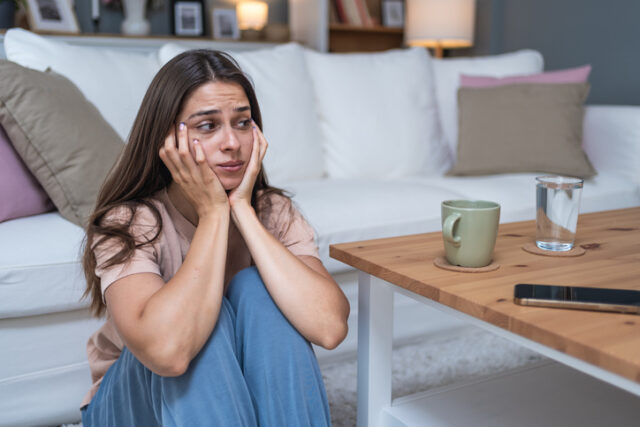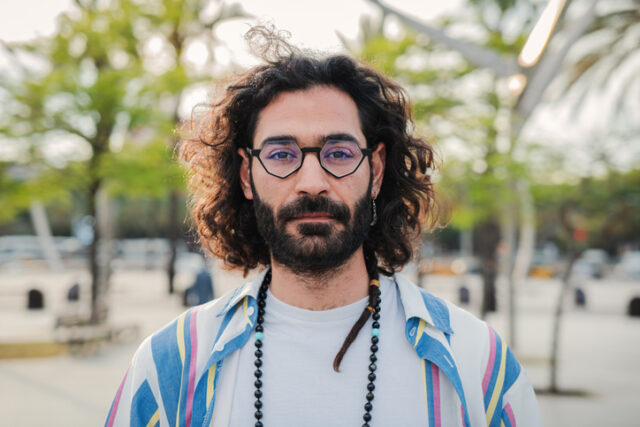Some people have guilty consciences by default, not because they’ve actually done anything wrong.

They apologise for everything, even the things that are clearly other people’s fault, and tend to carry around the heavy weight of remorse — and it sucks. If this sounds like you, here’s how to change things (because you deserve to feel at peace).
1. Recognise the difference between guilt and shame.

Guilt is about feeling bad for something you’ve done, while shame is feeling bad about who you are. Often, what we think is guilt is actually shame in disguise. When you catch yourself feeling guilty, ask yourself if you’ve actually done something wrong or if you’re feeling shame about not meeting unrealistic expectations. Understanding this distinction can help you address the root cause of your feelings more effectively.
2. Challenge your thoughts with evidence.

When guilt creeps in, take a step back and examine the situation objectively. Write down the reasons why you feel guilty, then list the evidence that contradicts these feelings. For example, if you feel guilty for taking a day off work, remind yourself of all the times you’ve worked hard and how rest is necessary for productivity. This exercise can help you see the situation more rationally.
3. Set clear boundaries with people (and actually stick to them).

Sometimes, we feel guilty because we’re trying to meet everyone else’s expectations. Learn to say no without apologising, and set clear boundaries about what you’re willing and unwilling to do. Remember, you’re not responsible for other people’s feelings or reactions. By setting healthy boundaries, you’re taking care of yourself and teaching other people how to treat you.
4. Practice self-compassion.

Often, we’re our own harshest critics. Try treating yourself with the same kindness you’d show a good friend. When you catch yourself feeling guilty, ask, “What would I say to a friend in this situation?” Then apply that compassionate perspective to yourself. Self-compassion can help counteract the negative self-talk that often fuels unwarranted guilt.
5. Reframe your perspective on mistakes.

If you’re prone to guilt, you might view any mistake as a moral failing. Try to reframe mistakes as learning opportunities instead. Everyone makes mistakes — they’re a natural part of being human and growing. When you catch yourself feeling guilty over a minor error, remind yourself that mistakes are how we learn and improve.
6. Identify and challenge your core beliefs.

Sometimes, misplaced guilt stems from deeply held beliefs about ourselves or the world. These might include thoughts like “I’m not good enough” or “I have to be perfect to be loved”. Identify these core beliefs and challenge them. Are they really true? Where did they come from? Working with a therapist can be particularly helpful in addressing these deep-seated beliefs.
7. Practice mindfulness to stay in the present.
 Source: Unsplash
Source: Unsplash Guilt often involves dwelling on the past or worrying about the future. Mindfulness techniques can help you stay grounded in the present moment. When you notice guilty feelings arising, try focusing on your breath or your immediate surroundings. This can help interrupt the cycle of guilt and bring you back to the here and now.
8. Communicate openly with people.

Sometimes, we feel guilty because we assume we’ve upset someone or let them down. Instead of stewing in these assumptions, communicate openly. Ask the person directly if everything is okay or if you’ve done something to upset them. Often, you’ll find that your fears were unfounded, and even if there is an issue, open communication allows you to address it directly.
9. Recognise and challenge your people-pleasing tendencies.

If you’re a people-pleaser, you might feel guilty anytime you put your own needs first. Start recognising these tendencies and challenge them. Remind yourself that it’s not only okay but necessary to prioritise your own well-being sometimes. Your needs are just as important as everyone else’s.
10. Create a ‘guilt-free’ zone in your life.

Designate a specific time or activity where you refuse to entertain guilty feelings. This could be during your morning coffee, while exercising, or during a hobby you enjoy. When guilt tries to creep in during this time, firmly remind yourself that this is your guilt-free zone. Over time, it can help you learn to push back against unwarranted guilt in other areas of your life too.
11. Get support from people you trust.

Sometimes, we need an outside perspective to see that our guilt is misplaced. Talk to close friends or family members about your feelings. They can often provide a more balanced view of the situation and reassure you that you haven’t done anything wrong. If guilt is a persistent issue, consider speaking with a therapist who can help you develop strategies to manage these feelings.
12. Focus on gratitude and positive actions.
 Source: Unsplash
Source: Unsplash When you’re caught up in guilty feelings, try shifting your focus to gratitude and positive actions. Make a list of things you’re grateful for or people you’ve helped. Engage in acts of kindness, not out of guilt, but from a place of genuine care. This can help replace guilty feelings with a sense of purpose and connection, reminding you of the positive impact you have on the world around you.




